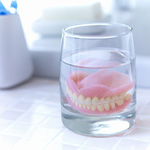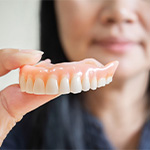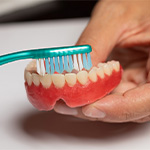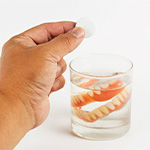Restore Form & Function with Full & Partial Dentures
 For hundreds
of years, dentures have been the go-to method for replacing missing teeth. Even George Washington wore a pair! While
the scope of restorative dentistry has certainly evolved over the years, eventually offering more sophisticated
solutions such as fixed bridges or dental implants, many of our patients at Zahner Dental still
prefer full or partial dentures when choosing a tooth replacement option because of their ease and affordability.
We’re happy to speak with you in depth about your thoughts and concerns when trying to decide on a tooth
replacement procedure at our Ellington, CT office; after all, no one knows your mouth better than you!
For hundreds
of years, dentures have been the go-to method for replacing missing teeth. Even George Washington wore a pair! While
the scope of restorative dentistry has certainly evolved over the years, eventually offering more sophisticated
solutions such as fixed bridges or dental implants, many of our patients at Zahner Dental still
prefer full or partial dentures when choosing a tooth replacement option because of their ease and affordability.
We’re happy to speak with you in depth about your thoughts and concerns when trying to decide on a tooth
replacement procedure at our Ellington, CT office; after all, no one knows your mouth better than you!
 How do dentures work?
How do dentures work?
For patients who aren’t familiar with the procedure, it might be hard to visualize how exactly you hold a whole or partial set of new teeth in your mouth every day. Full dentures are used to replace your top row, bottom row, or even both rows of teeth, and we’ll custom-make them to fit your unique features so that they feel comfortable and look great. They stay in place with the help of natural suction to the gums; however, these days, many patients instead choose to have dental implants placed underneath in order to provide a "snap" fit that is more functional and comfortable. At Zahner Dental, we’ll spend as much time as you need ensuring that you’ve got the best fit available with your full dentures.
Partial dentures, on the other hand, work a little differently. They consist of multiple teeth on a gum-colored base, and are created specifically for each patient’s unique tooth replacement needs. When placed, they’ll fit like a puzzle next to your existing teeth! They’re usually attached to your natural teeth with the help of clips or brackets, but more often, patients choose to have implants placed underneath so the clips are invisible. Although partial dentures tend to look similar to fixed bridges, they’re actually still removable, just like full dentures.
Don’t let tooth loss ruin your day – Drs. Warren, Shawn, and Jonathan Zahner are happy to provide you with a variety of effective restorative dentistry options, including full and partial dentures. Zahner Dental can offer you and your family a cozy atmosphere paired with an extensive menu of precise and personalized dental services. Contact our Ellington, CT office today to schedule your first appointment!
Understanding the Cost of Dentures

Just like any other dental restoration out there, the cost of dentures will vary from person to person. There are all sorts of factors that contribute to the price. During your initial consultation, we’ll determine exactly what you can expect to pay for your dentures in Ellington. In the meantime, here are some things for you to keep in mind.
Factors that Affect the Cost of Dentures

There are three main factors that will contribute to the cost of your dentures:
- The preparatory work needed before you get your restoration will contribute to the amount you pay. This includes treatments like gum disease therapy and tooth extractions.
- The type of materials used to create your dentures, like acrylic and porcelain, will affect their cost.
- The number of teeth that you are needing to have replaced. Generally, the larger the restoration, the more it will cost.
Remember that cheaper doesn’t mean better when it comes to dentures. By opting for budget dentures, you are more likely to require frequent repairs and replacements. When you invest in a quality restoration, you will surly notice the dentures.
Are Implant Dentures More Expensive?

Yes, implant dentures are more expensive than traditional dentures, but there is good reason for it. Instead of being supported by the shape and suction of the gum tissue, implant dentures are held into place by a series of dental implants that are placed into the jawbone via a surgical procedure. This allows for numerous other benefits, like being more lifelike and having additional stability. You don’t need to replace your dentures every 5 to 7 years either, as dental implants are made to last for several decades.
Does Dental Insurance Cover Dentures?

In most cases, you can expect some level of coverage for dentures. Many insurance plans cover up to 50% of your treatment, but this will vary depending on the plan you have. Our practice is in-network with Benecare, Anthem, Cigna, and Delta Dental. If you have any questions about your plan and what it covers, talk to one of our friendly team members.
Other Options for Making Dentures Affordable

If you don’t have dental insurance, you aren’t completely left on your own. At Zahner Dental, we are happy to work with 3 rd party financiers, like CareCredit, to provide low and no interest financing plans for qualified patients. If your benefit plan includes a flexible spending account (FSA) or health savings account (HSA), you can also used these funds for treatment.
To learn more about how much you can expect to pay for dentures, contact our office for a consultation. We’re looking forward to helping you get your smile back!
Dentures Aftercare

Dentures will transform the way your smile looks and how it functions when you eat, speak, and smile! However, just because you have your teeth back doesn’t mean that you should stop going to the dentist – even if you don’t have any natural teeth. Routine checkups are important for several different reasons. Your dentist will continue to monitor any existing teeth and gum tissue. They will also keep an eye out for any abnormalities that could indicate oral cancer. When you wear dentures, it is difficult to notice these changes on your own. Early detection is key to making a full recovery.
Remove After Eating

After you eat, remove and rinse off your dentures. This will help to prevent food debris and plaque from building up over time. When you rinse your dentures, don’t use hot water. High temperatures can warp the denture material and cause it not to fit properly.
Clean Your Restoration

Take your dentures out of your mouth to clean them. Using a soft-bristled toothbrush and a small amount of unscented hand soap, mild dish soap, or denture cleanser, gently brush your dentures. You shouldn’t use regular toothpaste because it is too abrasive for your replacement teeth. If you aren’t going to be wearing your dentures again immediately, keep them in a denture-soaking solution so they don’t dry out and lose their shape. When you go to put them back in, make sure to rinse them thoroughly.
Keep Your Dentures Safe

When you clean your dentures, it’s a good idea to keep a towel underneath. This way, if they accidentally slip out of your hands, they are much less likely to become damaged. Remember to always keep your dentures out of reach of small children and pets.
Remove When You Sleep

When you go to bed, you should take your dentures out. This will allow your gums to get more circulation and reduce soft-tissue irritation. Sleeping with dentures is also associated with higher levels of gum and tongue plaque. As you sleep, keep your dentures in a denture-soaking solution. If you allow them to dry out, they can permanently lose their shape.
Notice Changes

Always be on the lookout for changes occurring in your mouth. This includes things like sores, gum irritation, or signs of infection. If your dentures become damaged, you shouldn’t attempt to repair them on your own. You could end up damaging them further. Instead, give us a call so we can help. For dentures that are shifting, clicking, or showing other signs of not fitting properly, this is something you should bring up with us. Your dentures may need to be relined or replaced.
Denture FAQs

Dentures in Ellington are a tried-and-proven method to treat significant tooth loss. Although they have decades of success, it’s normal to have some concerns before you are ready to invest in them. Don’t worry, your dentist will explain everything during your denture consultation. Here are the answers to a few frequently asked questions to ensure they are right for you.
Can I sleep with my dentures?
Getting caught without your teeth can be embarrassing, but you don’t want to sleep with them in your mouth. Your denture dentist in Ellington will instruct you to wear them for 24 hours before getting in the habit of removing them nightly. Your oral health and the lifespan of your new teeth rely on taking them out. Your dentures will restrict blood circulation to your gums. If they aren’t given time to recuperate, it can lead to inflammation, sores, and infections. Removing your teeth will allow your tissues to receive vital nutrients to stay healthy. After you take them out for the night, clean them thoroughly to reduce oral bacteria that can affect your dental and general health. Bacteria and buildup can also weaken your denture, causing you to need a replacement sooner. You can safeguard your smile and health by brushing your dentures and soaking them in an overnight solution before calling it a night.
Does an upper denture always cover the palate?
An upper denture doesn’t always cover the palate. If you are concerned about discomfort or diminished taste, you have several styles to choose from, like a horseshoe-shaped base. Your dentist will review all your options to find the right style for your needs and preferences.
Do I use regular toothpaste to clean my dentures?
Your dentures aren’t subject to decay, but you can’t stop brushing. Don’t use regular toothpaste to clean your dentures because it’s abrasive. Hard bristled toothbrushes and toothpaste can cause microscopic scratches on your dentures. They can tarnish your smile’s appearance and trap bacteria that can make your dentures smell. Instead, it is better to use a soft-bristled toothbrush and mild hand soap or dishwashing liquid. You can also purchase cleaning kits made for denture wearers.
Can I eat steak with dentures?
It is possible to eat steak, but your dentist will recommend limiting how often you have it. Chewy meats will put more wear and tear on your denture. The pressure can also lead to gum or jaw pain. If you can’t skip a juicy steak, tenderize it before cooking it. Cut it into small pieces to make it easier to chew. Consider adding a denture adhesive for more stability.
What qualifies you for dentures?
If you’ve lost all or most of your teeth throughout an arch, you may be a candidate for dentures. They can also be the most cost-effective option for patients needing extensive dental work. Your dentist will examine your mouth and learn more about your medical history to ensure they are right for you. Generally, patients with good oral and general health can benefit from dentures.

